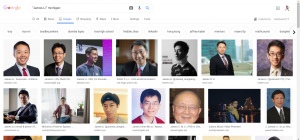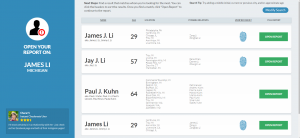User:Lijame
Growing up, daily use of the internet has almost been ingrained in me. I find it natural to look up questions I have on search engines, and while I personally don’t use social media that much, it’s easy to connect with people that you don’t normally talk to by hitting them up through a platform. My introduction to social media and having an online presence began with a Yahoo! email account that my mom helped me make, but I didn’t start having identifiable information online until I was allowed to make a Facebook account, where I posted a few profile pictures, and volunteered basic information about myself. My social media identity grew along with my actual identity, and with it my use of social media has ebbed and flowed. Nowadays, I’m present on a lot of social media platforms, even if I don’t regularly use their apps. Because of this, going into this assignment, my expectations were to find my social media profiles, and see some pictures I posted. Nothing too revealing, but I definitely expected to see myself. I had searched myself up before in high school and middle school and found pictures of my robotics team on Google Images so I didn’t think this assignment would be much different.
However, unfortunately for me, my name is exceedingly common. Li is the most common Chinese surname, and James is also a very popular name. When I search my name up on search engines, it is initially difficult to find any results pertaining to me specifically. Because of this, there is both a sense of relief and frustration. On one hand, it’s easier for me to blend into the masses, and I have the right to be forgotten, because my search results will never crowd out the hundreds of other James Lis with an online presence. This is also useful for privacy, as to find my information online, it’s hard to reach by just casual browsing, and you would instead need to do a deep search. Norman Mooradian says that “Control over access to ourselves and information about ourselves is justified by virtue of the enabling role this control plays in our ability to create and maintain the diversity of social relations that we count as part of a good life” in Importance of Privacy revisited [1]On the other hand, this makes it a lot harder to stand out, or to simply find out information about myself without going through numerous other steps. The popularity of my name is something that won’t change, so both the positive and negative effects of my name on my online identity are consequences that I’ll have to learn to deal with. I approach my digital identity differently than how I approach my personal identity, but all that means is that I need to develop different ways to control what information is about me online, such as not revealing sensitive details.
Search Engines
For someone with a name as common as mine, scrolling through the first page of Google Images reveals a broad array of different James Lis, each living their own life. To find any specific details, I need to add specific identifiers in my query, like the high school I went to, or my hometown. Even if I add “umich” as a tag, I don’t appear in the first page of results, or for the first page of images either. The most common results from narrowing down my searches to find myself end up being high school competitions I’ve competed in, in either sports like track or tennis, or academically. Even though I only ran one year of track in high school, my records are still online, and looking them up brought back a wave of nostalgia. My old biology and math competitions resurfaced as well, and in doing so remind me that there is an archive of everything that I’ve competed in that remains intact. I was able to find my LinkedIn and Facebook pages, and from there I can actually find information about myself.
The image that Google has built up of me is very surface level, as its hard for my social media profiles to surface over other James Lis, who may have more followers or connections. Because of this, and me having to add specifiers in my query, it’s possible that this is a skewed view of my online identity, and an inaccurate representation of my data online. However, being as these were the most accessible ways to see information about myself, and the only methods I’ve found that work well so far, I see this as a product of the search engine algorithms rather than a flawed methodology. This reveals that my online persona, at least through search engines, seems to be heavily weighted toward my high school actions, which doesn’t accurately convey my present interests or being as a person. Through search engines like Google, I am able to find truthful information about myself, but the trade-off is that I have to clarify which James Li I am in ways that may skew the data.
Data Brokers
Another way to find information about yourself is to ask for it from the sites that keep track of information about all individuals online and contact the data brokers. I went through a pretty exhaustive search of a few different data broker sites, starting with high priority ones like Instant Checkmate. The first few suffered from the same problem as Google searching did; there were just too many James Lis that even if I specified my city, I would find a completely different person’s report. As this was an expected obstacle at this point, I kept looking for information about me, and eventually, I was able to find a site that seemed to finally have the right guy. Even then however, there were still a few mistakes. The report found my address, zip code, and relatives, but it also seemed to have gotten me mixed up with yet another James Li, when asking about people I knew. In a way, I’m glad that there isn’t such a comprehensive list on me that someone can find out everything about me just by getting a data brokers report, but again, like with the search engine results, it is still a bit disappointing.
Analysis
Through slowly refining my search queries, I was able to fine-tune my results so that I was able to see information about myself. Now that I know the types of data about me that can be found online, it is easier to manage expectations of my online identity. From simple Google searching and even using data reports, it is still very difficult to find information about the “real me.” The truth of my online presence is that it’s actually really easy to see the forest for the trees, and with a name as common as my own, finding the details is actually the hard part. My online data profile does reveal some key truths about my interests, but these are only glimpses into the life I live, as more recent information is mostly lost to the later pages of Google search. In fact, if I only search my name with no other qualifiers, there are no results related to me in the first 15 pages of Google results. However, I am able to reach my social media profiles if I search up the platforms, and from these I’m able to see scrapes of my digital persona through different lenses. On LinkedIn, I project a formal and professional version of myself, while on Facebook, I have very relaxed and fun profile and cover photos to project this aspect of my personality as well. This assignment has helped me realize the trade-offs of privacy. We don’t ever entirely exist on the internet, but some strange tokens of your past may live on well into the future, even if they only offer a small look into how you are as a person.
References
- ↑ Mooradian, N. The importance of privacy revisited. Ethics Inf Technol 11, 163–174 (2009). https://doi.org/10.1007/s10676-009-9201-2

